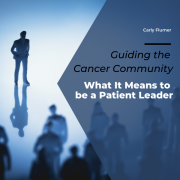Guiding the Cancer Community: What It Means to be a Patient Leader
We all have leaders we look up to, whether it be a friend, family member, mentor, or coach. In the patient community, we also have people we look up to who are making waves in the cancer advocacy world. But what does it mean to be a leader and/or an influencer? What qualities does this person have? How active are they in different communities and social media platforms?
There’s power in sharing your story, and that’s one of the most crucial ways in becoming a patient leader. However, many of us are scared to share. I know I was when I got my first diagnosis, and then my second. Questions I asked myself were, “What will people think of me and/or what will they say,” and “Will I receive support?” When I gathered the courage, I posted my first picture on Instagram and then shared it on Facebook. The amount of support I received from family and friends, including friends I hadn’t heard from in years, was overwhelming. So, I opened up and began to share more. I knew my story was unique being a 27-year-old (adolescent and young adult [AYA]) thyroid cancer patient (a rare cancer) who was working full-time and putting myself through graduate school. So, I decided to share it in whatever way I could, and if I was told, “No, thank you,” I kept looking until I heard “Yes, we’d love to share your story!” again and again.
As an active member of the cancer patient community, I have had numerous opportunities to identify myself as a patient leader and share my story, as well as my point of view on different assets of healthcare, in multiple formats. I measure my own success by the number of people I impact with my advocacy, whether it’s in a small or large way. While this is not always known and/or cannot always be seen, I know that I’m at least helping and/or impacting one person with whatever I tweet, blog, share a video, or speak on a podcast about, which can then be shared with others.
So how can you get started in becoming a patient leader? Here are some suggestions:
- Share your story on social media platforms, including Instagram and Facebook
- This may include on your personal page as well as support groups
- Participate in tweet chats dedicated to specific topics you’re interested in, including #patientchat. Use the website, Symplur, to find relevant healthcare topics that are trending
- Look for cancer and healthcare-related podcasts. Email them to ask if they’re accepting guests
- Look for cancer and/or healthcare-related journals and blogs. Ask if they’re accepting guest submissions
- Network with other patient leaders and ask how they got started and what resources they used/are currently using
Finally, remember there’s no “right” way to lead. We’re all patients with our own unique stories. Whichever way you decide to share it, know that you’re helping someone not feel so alone. That’s what a real leader is to me.
Carly Flumer is a young woman who was diagnosed with stage I papillary thyroid cancer at the age of 27. She recently received her Master’s degree from Boston University in Health Communication and received her Bachelor’s from George Mason University in Health Administration and Policy. While being diagnosed with the “C” word at such a young age was a surprise, as it would be to anyone, she found strength, support, and inspiration in sharing her cancer journey on social media. As a result of her health outcome, she looks to advocate for other cancer patients through education, research, and health literacy.




